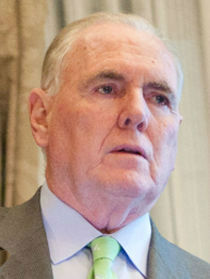
Culture
The distorted lawmaking in Grant's era ... marked the beginning of a steep descent from the Founders' vision of educational freedom

Gass
''Man proposes and God disposes," begins the best-selling 1885 "Personal Memoirs of Ulysses S. Grant."
"There are but few important events in the affairs of men," he continues, "brought about by their own choice."
March marks the 150th anniversary of the first inauguration of Republican President Ulysses S. Grant, who is best known as the military leader of the Union Army during the Civil War, but is generally ranked as among the worst presidents in American history.
After the national trauma of the Civil War, many hoped Grant might become a unifying figure, in the profile of Washington or Lincoln. That proved to be wishful thinking, especially in the realm of education.
Our Founding Fathers' civic vision of education was one of local control and Enlightenment ideals about religious liberty. Across the early republic, state and local funds moved freely among religious teachers, families, and schooling.
By contrast, in the late 19th century, President Grant and Congressman James Blaine, an ambitious Maine politician nicknamed the "Continental Liar," pushed for a federal "anti-aid amendment" to the U.S. Constitution, which was intended to prohibit disbursement of public funds to parochial-school families.
In December 2018, the Montana Supreme Court used the state's Blaine Amendment to strike down a legislatively established education tax credit program. This school-choice program allowed taxpayers who donate to private, non-profit scholarship organizations to receive a small tax credit.
In turn, these non-governmental scholarship-granting organizations provide assistance to low-income families to send their children to private or religious schools of their choosing. Nationally, over 250,000 students access private-school choice through education tax credit programs.
As with government-backed higher education loans, K-12 school funding should follow the student, freeing parents -- not the state -- to choose from a variety of public, private, and parochial-school options for their children.
The Montana case could find its way to the U.S. Supreme Court. It highlights the notoriously bigoted, anti-religious legacy of state Blaine Amendments, which gained traction largely because of President Grant.
"Grant's administration outraged every rule of ordinary decency," observed celebrated 19th-century historian and descendant of two American presidents, Henry Adams. Grant was "pre-intellectual, archaic, and would have seemed so even to the cave-dwellers."
Historian Jonathan Sarna's book, "When General Grant Expelled the Jews," reveals earlier religious bigotry. Grant's anti-Semitic General Order No. 11 of late 1862 stated: "The Jews, as a class violating every regulation of trade . . . Are hereby expelled from (Tennessee, Mississippi, and Kentucky)." President Lincoln quickly rescinded General Grant's infamous directive.
In an anti-Catholic 1875 speech to Civil War veterans in Iowa, President Grant discussed supporting monolithic public schools, while discriminating against religious ones: "Encourage free schools and resolve that not one dollar ... appropriated to their support, no matter how raised, shall be appropriated to the support of any sectarian school."
Two months later, in his State of the Union Address, President Grant formally proposed: A "constitutional amendment . . . Prohibiting the granting of any school funds or school taxes, or any part thereof, either by legislative, municipal, or other authority, for the benefit or in aid, directly or indirectly, of any religious sect or denomination ..." He also recommended taxing church property.
Following Grant's speeches, the opportunistic Blaine from Maine took up his president's battle cry and pushed for a national Anti-Aid Amendment that only barely failed to win congressional approval.
The distorted lawmaking in Grant's era -- which many historians believe closely resembles the pay-to-play political culture of our own troubled times -- marked the beginning of a steep descent from the Founders' vision of educational freedom.
Over the next 20 years, Grant and Blaine's anti-Catholic, nativist agenda encouraged adoption of 20 state Anti-Aid Amendments. Today, 38 states have these bigoted amendments that block greater school choice.
"The progress of evolution from President Washington to President Grant," Henry Adams wrote, "was alone evidence enough to upset Darwin."
General Grant was undoubtedly a successful military leader and author. But fate providentially disposed of President Grant's discriminatory amendment proposal to our Founding Founders' sacred Constitution.
Today, the forces of religious liberty and school choice need to rally in support of the U.S. Supreme Court's taking up and striking down the infamous, anti-constitutional legacy of state Blaine Amendments, which still insult the legal integrity of our republic.
RAYMOND FLYNN IS THE FORMER U.S. AMBASSADOR TO THE HOLY SEE AND MAYOR OF BOSTON. JAMIE GASS DIRECTS THE CENTER FOR SCHOOL REFORM AT PIONEER INSTITUTE, A BOSTON-BASED THINK TANK.
- Raymond L. Flynn is the former U.S. Ambassador to the Holy See and Mayor of Boston.
Recent articles in the Culture & Events section
-
Tolkien's world, still popular on the big screen, began with faith and wordsCecilia Hadley
-
Scripture Reflection for Dec. 22, 2024, Fourth Sunday of AdventDeacon Greg Kandra
-
Getting adult children to Christmas MassGreg Erlandson
-
The work of redemptionEileen McLaughlin
-
Intern reflectionsEmily Greco and James Kaeser


















